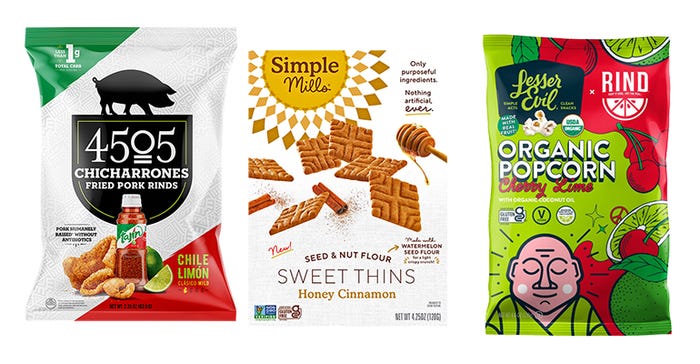
The word “trend” is a tricky one. It implies not only what’s happening now—what tendencies are driving consumers and where they’re putting their dollars—but also what the market should consider for the future of manufacturing, stocking, merchandising and more.
We at New Hope Network believe it’s critical to explore the “why” behind trends. (Yes, we too have been guilty of the occasional trend-spotting foible over the years: Spirulina lavender cricket bars, anyone?) The why, or “macro forces,” are most relevant to shaping the future of natural products and have their origins in three paradigm-shifting “cultural forces” we identify as “Purpose-driven Commerce,” “Holistic Health and Well-being” and “Modern Life.” Zoom in even further and within these macro forces are more nuanced trends that help indicate how the industry is innovating.
The In the Aisle section of the Expo East 2022 edition of Natural Foods Merchandiser includes expert analysis from New Hope’s editors, who provide in-depth commentary on 10 newer, still-emerging trends, as well as their market manifestations from Natural Products Expo East exhibitors. These trends provide a glimpse of where the market is going and which trends we predict will continue to shape it in the future.—Adrienne Smith
Competition continues to evolve into collaboration in the natural products industry where new partnerships are fueled by myriad goals that drive innovation, increased brand awareness, shared values and missions and, more recently, sustainability goals.
The ability to reach new audiences through partnerships is an obvious draw. A great example of this is the recent collaboration between 4505 Meats and Mexican spice brand Tajín, through which both brands are connecting with new audiences with diverse backgrounds. The brands are simultaneously elevating one another through taste, recognition and bilingual marketing campaigns.
For brands focused on increasing sustainability, upcycling partnerships are a win-win-win. A new product is created for one brand, the other brand reduces or eliminates waste from leftover materials/product, and the impact is positive for the environment.
In addition to partnering for waste reduction, brands are getting behind a variety of initiatives that offer support to farmers. One example is Gaia Herbs, which partnered with Green Heffa Farms—a BIPOC, woman-owned, Certified B Corporation, organic farm—to develop the Gaia Herbs Equity Partnership Program to help BIPOC farmers and herbalists.
Regenerative agriculture is another place where brand-farmer partnerships are helping create measurable impact. Almond-heavy brands Simple Mills, Cappello’s and Daily Harvest recently announced a partnership with Treehouse California Almonds called The Almond Project. This farmer-led initiative was founded with the long-term objective of creating regenerative agriculture systems to make almond farming more sustainable. Its five-year plan will involve transitioning 80 acres of farmland to regenerative agriculture, while alleviating financial risks to farmers.
These are just a few examples from the growing list of brands teaming up to help achieve shared goals and create real solutions for sustainability challenges.

4505 Meats Chile Limón Chicharrones This collaboration with Tajín combines light and airy pork rinds made from sustainably sourced pork from small family farmers with the taste of savory chili peppers and lime. SRP: $4.99 Booth: 1956
Simple Mills Honey Cinnamon Seed and Nut Flour Sweet Thins Made from a blend of watermelon seeds, cashew, sunflower and flax flours and sweetened with coconut sugar, this product aligns with the brand’s goal of improving soil health and protecting biodiversity. SRP: $5.39 Booth: 2606
LesserEvil and Rind Snacks Organic Cherry Lime Popcorn For this inventive, upcycled popcorn collaboration, LesserEvil’s USDA Organic popcorn is tossed in upcycled coconut oil and cherry and lime fruit powders from Rind Snacks. SRP: $6.00/2-pack Booths: 4183 and 1810
About the Author
You May Also Like
.png?width=700&auto=webp&quality=80&disable=upscale)




